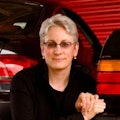Standard operating procedures, common practices designed to yield predictable outcomes
And the focus of this year's IBIS was essentially "consistency;" the standard operating procedures, and the push for common practices among shops in various networks and groups, are all designed not just for efficiency, but to give our customers and those that pay for repairs "predictable outcomes."
David Murby, a speaker at IBIS who shared his research into shop networks around the world, for example, said too many shops join networks – franchises, buying groups, supplier-sponsored programs – with the key goal of getting more work. Murby said, however, those networks can often do less to directly bring in work than they can to help a network of shops implement standards to provide consistent outcomes.
That's the real goal shops should have in deciding to join a network, Murby said, because it is only the successful implementation of such standards that will attract sources of work to the network. More insurers – smaller ones in particular – will likely move from trying to manage their own networks of shops to finding existing networks that can self-manage, audit the performance of its network members to provide predictable outcomes.Murby's presentation was one of only a handful at this year's IBIS that actually focused directly on the collision repair industry. IBIS organizers chose many speakers from outside the industry in an effort to offer some fresh perspectives and a look at how comparable issues are being addressed in other industries.
A business school professor who focuses on the automotive industry, for example, said likely changes by and among the automakers in the coming decade will make things less and more challenging for collision repairers. Professor David Bailey said electric (and eventually hydrogen-fueled) vehicles will gradually replace diesel and gasoline powertrains, but we can expect to work with a mix for many years to come. Electric-powered cars, for example, still will only account for one-third of cars in 2020, he predicted. On the other hand, the expense of developing new vehicles will lead more automakers to share more platforms, Bailey said, perhaps allowing for a little more consistency in repair techniques among vehicles.
One of the other presentations from outside the industry that I also think offered a key message for shops and insurers was one by Howard Leach, head of operations of the aircraft safety academy in the United Kingdom. It was hard not to think about the push for cycle time within our industry this past decade when Leach discussed how airline pressures to get and keep planes flying sometimes comes into conflict with the need for thorough safety, maintenance and repair work and inspections.
Leach was asked about how, if specific collision repair standards were established in the United States, current technical and commercial practices – and the sometimes seemingly conflicting desires of shops and insurers – can be balanced.
"You're talking about a cultural shift," Leach acknowledged. "One of the key phrases we often hear is, 'If you want me to be safe, I can't get the aircraft out on time.' So we're almost holding safety up against commercial pressure. The challenge is to get everyone to actually recognize that if you get it right the first time, it's going to help you with your business case anyway. You've got to shift people's paradigms so they align safety and business in the same breath. Because they really are the same."
It's my hope that as insurers and shop networks push for those "predictable outcomes" they won't lose sight of that key point: The safety of our customers who are counting on us for complete, quality repairs should never take second place to any other business goals.
Contact info: [email protected]
About the Author
Camille Eber
Camille Eber has been the second-generation owner of Fix Auto Portland East in Portland, Ore. since 1989. The company, founded in 1946, has earned the I-CAR Gold Class Professionals designation every year since 1991, and won the “Business Integrity Award” presented by the Better Business Bureau of Oregon and Western Washington in 1997.
